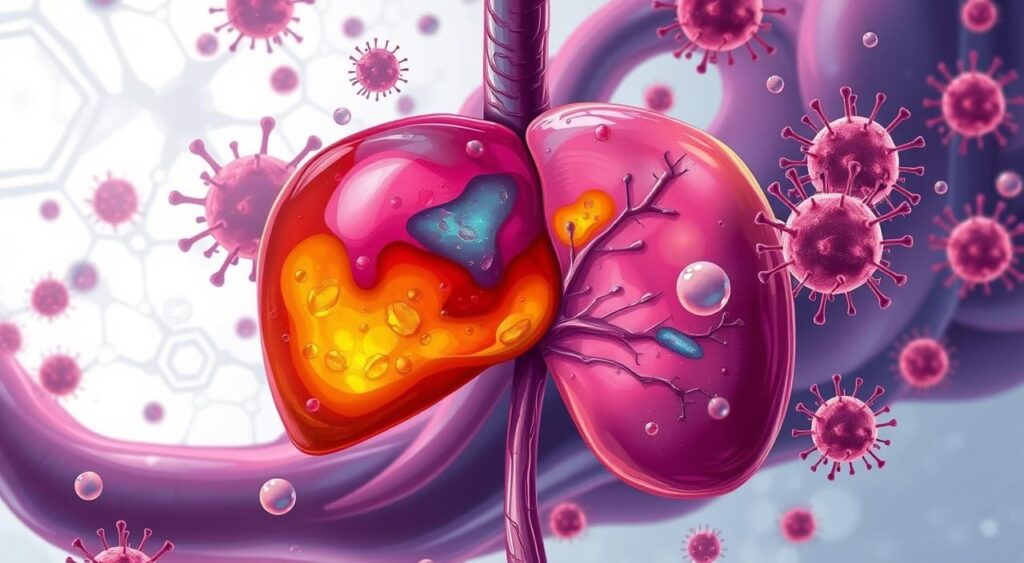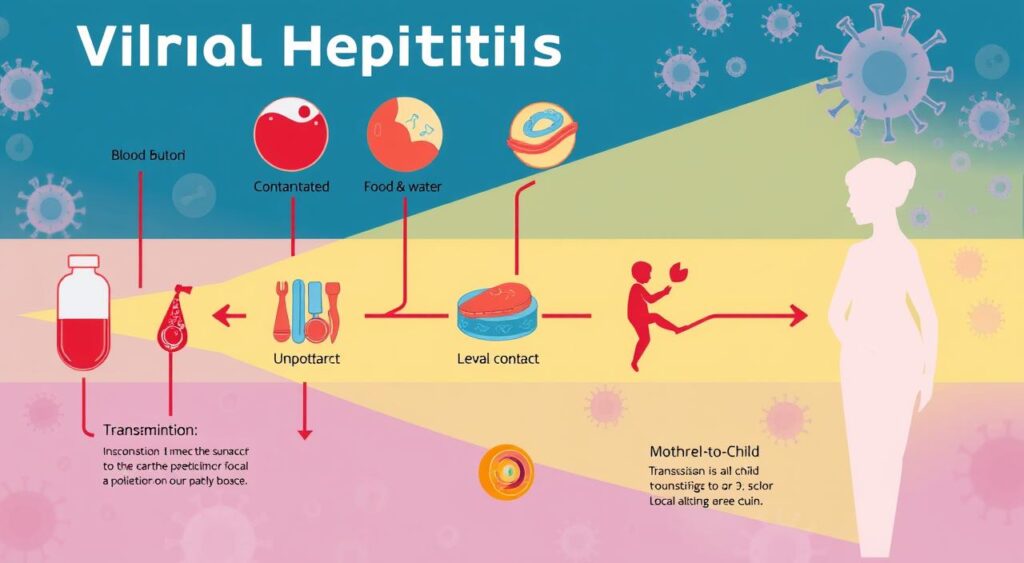Did you know that viral hepatitis affects over 325 million people worldwide? It’s a big public health issue. This disease mainly hits the liver and can lead to serious problems if not treated.
It’s important to know how viral hepatitis starts, what symptoms it has, and how to treat it. This knowledge helps keep your liver healthy and prevents serious issues.

Viral hepatitis is a term for several liver diseases caused by different viruses. These viruses include hepatitis A, B, C, D, and E. They can spread through contaminated food or water, unsafe sex, or touching infected blood or fluids.
Knowing the specific traits and risks of each type of viral hepatitis is key. It helps in preventing and managing the disease.
Key Takeaways
- Viral hepatitis is a global public health concern, affecting over 325 million people worldwide.
- It is a group of infectious liver diseases caused by different viral pathogens, including hepatitis A, B, C, D, and E.
- Understanding the causes, symptoms, and transmission routes of viral hepatitis is crucial for prevention and treatment.
- Effective management of viral hepatitis involves early diagnosis, appropriate medical intervention, and lifestyle modifications.
- Advancements in treatment options have significantly improved the prognosis for individuals living with viral hepatitis.
What is Viral Hepatitis: Definition and Overview
Viral hepatitis is a serious liver condition caused by different viruses. These viruses can cause liver inflammation. Symptoms include jaundice, fatigue, and stomach pain. Knowing about viral hepatitis helps in preventing and treating it.
Common Signs and Symptoms of Hepatitis
The main symptoms of viral hepatitis are:
- Jaundice (yellowing of the skin and whites of the eyes)
- Fatigue and weakness
- Loss of appetite
- Nausea and vomiting
- Abdominal pain
- Dark-colored urine
- Light-colored stools
How Viral Hepatitis Affects the Liver
Viral hepatitis mainly harms the liver, causing inflammation and damage. The liver filters toxins, regulates blood, and breaks down nutrients. When it’s inflamed, the liver can’t do these jobs well. This can lead to serious health issues if not treated.
Types of Viral Hepatitis Infections
There are several types of viral hepatitis, each from a different virus:
- Hepatitis A
- Hepatitis B
- Hepatitis C
- Hepatitis D
- Hepatitis E
Each type has its own traits, how it spreads, and treatment. Knowing the types is key to diagnosing and managing the condition.
Major Risk Factors and Transmission Routes
Viral hepatitis is a serious health issue. It can be caught in different ways. Knowing how it spreads helps us prevent it and manage it better.
Exposure to contaminated blood is a big risk factor. This can happen through shared needles, unprotected sex, or medical procedures. People who take risks, like using needles or having unprotected sex, are more likely to get it.
Consuming contaminated food or water is another risk. Poor hygiene and sanitation can spread hepatitis A. Traveling to places with bad water and sanitation also raises the risk.
| Transmission Route | Examples |
|---|---|
| Blood-to-blood contact | Sharing needles, unprotected sex, medical procedures |
| Contaminated food and water | Poor sanitation, unsanitary food preparation, travel to high-risk regions |
| Mother-to-child transmission | During pregnancy, childbirth, or breastfeeding |
Viral hepatitis can also spread from mother to child. This happens during pregnancy, childbirth, or breastfeeding. Screening and vaccinating pregnant women can help prevent this.
Knowing how viral hepatitis spreads helps us stay safe. We can prevent it by practicing safe sex, not sharing personal items, and keeping clean. This is especially important when traveling to risky places.

Hepatitis A: Causes, Symptoms, and Prevention
Hepatitis A is a viral infection that mainly affects the liver. It’s usually a short-term illness and doesn’t cause long-term liver disease. Knowing how it spreads and how to prevent it is key to staying safe.
Transmission Methods of Hepatitis A
Hepatitis A spreads through contaminated food or water and close contact with someone who’s sick. It happens when people don’t wash their hands well. This includes not washing hands after using the bathroom or before eating.
Prevention Strategies for Hepatitis A
- Vaccination: The hepatitis A vaccine is very effective. It’s recommended for kids and adults at high risk.
- Proper Hygiene: Washing hands with soap and water often helps stop the virus. Do this before eating and after using the bathroom.
- Safe Food Handling: Cooking food well and avoiding raw shellfish can lower the risk of getting hepatitis A.
Treatment Options for Hepatitis A
Most people get better on their own without treatment. But, in serious cases, they might need to go to the hospital. Rest and staying hydrated are usually the best ways to manage it.
By knowing how hepatitis A spreads and how to prevent it, we can protect ourselves and others. Vaccines and good hygiene are the best ways to stop it.
Hepatitis B: Understanding the Silent Epidemic
Hepatitis B is a serious liver disease that affects millions. It’s often called a “silent epidemic” because it can go unnoticed. This can lead to severe problems if not treated early.
The hepatitis B virus (HBV) spreads easily. It can be caught through sex without protection, sharing needles, or from mother to child at birth. Many people don’t know they have it because it starts with no symptoms.
Hepatitis B can turn into cirrhosis, a serious scarring of the liver. Cirrhosis can cause liver failure and increase the risk of liver disease and cancer. This shows why finding and treating hepatitis B early is so important.
“Hepatitis B is often called the ‘silent epidemic’ because many people don’t know they have it. It’s crucial to get tested and seek medical care if you’re at risk.”
Thanks to medical research and vaccines, there’s hope against hepatitis B. But, we must keep spreading the word and teaching people how to prevent it.

Learning about hepatitis B and how it spreads can help us protect ourselves and our families. Early detection and treatment are essential to fight this disease and ease its impact on health and healthcare systems globally.
Hepatitis C: Long-term Health Implications
Hepatitis C is a viral infection that can affect your health for a long time. It’s different from hepatitis A and B because it often becomes chronic. This means it can cause serious liver damage if not treated.
Diagnosis and Testing Methods
To find out if you have hepatitis C, doctors use a two-step test. First, they check for antibodies in your blood. If that test shows something, they do a second test to see if the virus is active. Finding it early is important for treatment.
Modern Treatment Approaches
New medicines have made treating hepatitis C much better. These direct-acting antiviral (DAA) drugs help get rid of the virus. With these treatments, many people can fully recover and stop liver disease from getting worse.
Living with Chronic Hepatitis C
If you have chronic hepatitis C, you need to watch your liver closely. Sometimes, the virus can damage your liver too much, requiring a liver transplant. People with chronic viral hepatitis should stay healthy, eat right, and follow their doctor’s advice to manage their disease.
“Early detection and effective treatment are key to managing the long-term health implications of hepatitis C. With the right approach, many individuals can achieve a full recovery and prevent the progression of liver disease.”
Prevention Strategies and Vaccination Options
Viral hepatitis is a serious health issue, but we can fight it. Hepatitis prevention is key to stopping these viruses and keeping everyone safe.
Vaccines are a top way to prevent viral hepatitis. There are vaccines for Hepatitis A and B. These shots are a must for people at high risk, like doctors and travelers to high-risk areas.
- Hepatitis A vaccine: This vaccine is given in two doses for lasting protection against Hepatitis A virus.
- Hepatitis B vaccine: You need three doses of this vaccine to prevent Hepatitis B virus infection.
Other ways to prevent hepatitis include:
- Washing your hands often
- Not sharing personal items like razors and toothbrushes
- Practicing safe sex with condoms
- Getting regular health checks and tests
It’s also important to educate people about viral hepatitis. Knowing how it spreads and how to get tested helps everyone stay safe.
| Vaccination | Dosage | Efficacy |
|---|---|---|
| Hepatitis A | 2 doses | Over 95% effective |
| Hepatitis B | 3 doses | Over 90% effective |
By using these hepatitis prevention methods and getting vaccinated, we can all stay healthy. This helps fight viral hepatitis and keeps our communities safe.
Complications and Long-term Health Effects
Viral hepatitis can cause serious health problems if not treated. It can lead to cirrhosis and increase the risk of liver cancer.
Development of Cirrhosis
Chronic viral hepatitis, like hepatitis B and C, damages the liver over time. This damage can cause scar tissue, known as cirrhosis. Cirrhosis makes the liver work poorly and can cause many problems, like fluid buildup and bleeding.
Liver Cancer Risk Factors
People with chronic viral liver disease face a higher risk of liver cancer. The scarring and inflammation from cirrhosis can lead to cancerous tumors in the liver.
Quality of Life Impact
Viral hepatitis can greatly affect a person’s quality of life. Problems like cirrhosis and liver cancer can cause severe symptoms and emotional distress. It’s important to manage and treat viral hepatitis to prevent these issues and improve well-being.
“Viral hepatitis is a silent epidemic, and the long-term health effects can be devastating if not properly addressed.”
Treatment Options and Medical Interventions
Dealing with viral hepatitis treatment can be tricky. But, thanks to new medical discoveries, there are many effective ways to help. Doctors can now create treatment plans that fit each person’s needs, from medicines to transplant surgeries.
For acute viral hepatitis, the first step is to manage symptoms and stop the virus from becoming chronic. Medicines for hepatitis A and B can help the body get rid of the virus faster. This can also lower the chance of serious liver damage later on.
Chronic viral hepatitis needs long-term care. Doctors use antiviral drugs together to slow down the disease. Sometimes, this can even lead to a cure, known as a sustained virological response (SVR). It’s also important to keep an eye on the liver and make healthy lifestyle choices.
When the liver is very damaged or fails because of viral hepatitis, a liver transplant might be needed. This surgery replaces the sick liver with a healthy one. It gives people with severe liver disease a second chance at life.
| Treatment Option | Applicability | Effectiveness |
|---|---|---|
| Antiviral Medications | Acute and Chronic Viral Hepatitis | High, can suppress virus and lead to SVR |
| Liver Transplant | Advanced Liver Disease or Failure | High, can extend life expectancy and improve quality of life |
As medical science keeps improving, the future looks bright for viral hepatitis treatments. Patients can work with their doctors to find the best treatment. This way, they can make choices that help them get the best results.
Living with Viral Hepatitis: Lifestyle Changes and Management
Living with viral hepatitis means making big changes in your life. You need to think about what you eat, how much you exercise, and how you handle stress. These changes can help you manage your condition and feel better overall.
Dietary Recommendations
Eating right is key when you have viral hepatitis. Focus on foods that are good for your liver, like fruits, veggies, whole grains, and lean meats. Try to avoid foods that are bad for your liver, like fatty, fried, and sugary ones.
Exercise and Physical Activity Guidelines
Staying active is important for people with viral hepatitis. Try activities like brisk walking, swimming, or low-impact aerobics. They can help your liver work better and make you feel better. Always talk to your doctor before starting any new exercise routine.
Mental Health Support
Having viral hepatitis can affect your mental health. It’s important to talk to a mental health professional, like a therapist or counselor. They can help you deal with the emotional side of managing your condition. Activities like meditation, yoga, or joining a support group can also help.
By making these lifestyle changes, you can take charge of your health. Remember, talking to your healthcare team is key to getting the right care for you.
Conclusion
Viral hepatitis is a big health problem that needs our attention. We must prevent it, find it early, and manage it well. Knowing about hepatitis, how it spreads, and its long-term effects helps us protect our livers.
Preventing hepatitis is key. We can do this by getting vaccinated, practicing safe healthcare, and avoiding risky behaviors. Early detection through tests is also vital. It lets us start treatment quickly.
If you have hepatitis, living healthy and following your doctor’s advice is important. This helps manage the disease and lowers the chance of serious problems. By staying informed and taking action, we can all help fight viral hepatitis and promote hepatitis prevention in our communities.
FAQ
Q: What is viral hepatitis?
A: Viral hepatitis is a group of diseases that harm the liver. They cause inflammation. If not treated, these viruses can damage the liver severely.
Q: What are the common signs and symptoms of viral hepatitis?
A: Symptoms include feeling very tired, nausea, and vomiting. You might also have abdominal pain, dark urine, and jaundice.
Q: How does viral hepatitis affect the liver?
A: It makes the liver inflamed. This can stop it from doing important jobs like filtering toxins and making blood clotting factors.
Q: What are the different types of viral hepatitis infections?
A: There are mainly three types: Hepatitis A, B, and C. Each has its own virus, way of spreading, symptoms, and treatment.
Q: How can viral hepatitis be transmitted?
A: It spreads through blood contact, contaminated food and water, and sex. Staying clean, getting vaccinated, and practicing safe sex can help prevent it.
Q: What are the causes and symptoms of Hepatitis A?
A: Hepatitis A comes from a virus and spreads through food or water. Symptoms include fever, tiredness, nausea, and jaundice.
Q: How can Hepatitis A be prevented?
A: Vaccination and good hygiene, like washing hands often and cooking food safely, can prevent Hepatitis A.
Q: What are the long-term health implications of Hepatitis B?
A: Chronic Hepatitis B can cause serious liver damage. This includes cirrhosis and a higher risk of liver cancer if not treated.
Q: How is Hepatitis C diagnosed and treated?
A: Blood tests diagnose Hepatitis C. Modern treatments can cure it in many cases. But, chronic Hepatitis C can lead to cirrhosis and liver transplant needs.
Q: What are the potential complications of viral hepatitis?
A: Complications include cirrhosis, liver cancer, and needing a liver transplant. Managing the condition and regular check-ups are key to avoiding these issues.
Q: What lifestyle changes can help manage viral hepatitis?
A: Eating well, exercising, and getting mental health support can help. These changes can improve your health and well-being.
